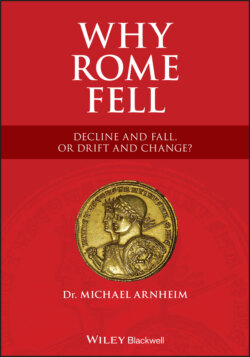Читать книгу Why Rome Fell - Michael Arnheim - Страница 23
“Republic” and Democracy
ОглавлениеThe English word “republic” is a translation of the Latin res publica. The Latin adjective publica is a contraction of the non-existent *populicus, from populus, “the people.” So, res publica means, literally, “the people’s thing, the people’s business,” hence “public or civil affairs, public or civil administration, public or civil power,” and hence “the state, commonwealth, republic.” (Lewis & Short.) It generally refers to the Roman state, as against foreign states, for which the word civitas was preferred, and from which (via the French) we have the English word “city.”
It is important to note that, in referring to the Roman state, res publica did not identify any particular form of government and was still used to refer to the Roman state long after the Roman Republic had ceased to exist and when Rome was ruled by emperors. For example, in the dedication by Pliny the Elder (23–79) of his Historia Naturalis (Natural History) to the future Emperor Titus, he congratulates Titus on his service to the state, this term being expressed by res publica, written in 77, more than a century after the end of the Roman Republic. (Pliny, Natural History, 3.)
The term res publica clearly, therefore, carries no implication of democracy even though it is based on the word populus, meaning “the people,” The acronym SPQR, for Senatus Populusque Romanus (The Roman Senate and People), a corporate designation of the Roman state, likewise carries no implication of democracy and is also not associated with a republican form of government. In fact, it is first encountered only in the late Republic and continued to be used well into Imperial times. Both the Arch of Titus, dating from 81 (CIL VI 945), and the Arch of Septimius Severus, constructed in 203 (CIL VI 1033), were dedicated to the memory of these emperors by The Roman Senate and People, the latter well over two centuries after the demise of the Roman Republic.
